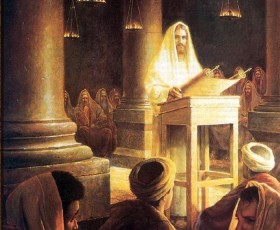While Jesus lived on earth, He did indeed observe the Mosaic laws specified in the Old Testament which helped establish the Jewish nation as God’s vehicle for evangelizing the world. However, we recognized from our study last week that many of these laws were prophetic in nature, pointing forward to the Messiah, and therefore are not binding on Christians today.
But what about all the rituals that rabbis over the centuries had added to the Mosaic law? Although Jesus respected the original intent of these traditions, He didn’t, at that time, feel obligated to keep all of them. They had been elevated to the level of law, and that was one of the problems we discovered this week in our study of Christ and tradition. Just what place does and should tradition and rituals play in our lives today? How do we recognize a good tradition when we see one?
Key Text: “‘”This people honors me with their lips, but their heart is far from me; in vain do they worship me, teaching as doctrines the precepts of men”‘” Matthew 5:8, 9 RSV
Jesus came to free the Jews from the burdensome rabbinical laws that had become so profuse and troubling to even the most faithful follower of God.
What did Jesus have to say about man-made laws and the rabbis who upheld them?
Sunday: Seat of Moses
Jesus confronts the “scribes and Pharisees” on many occasions, and we first take a look at the members of this elite group of religious leadership. Who exactly were they and what did they represent? Acts 23:9 seems to indicate that scribes, who were experts in legal matters, made up a part of the Pharisees, a Jewish sect, whose name meant “to separate”. Pharisees felt they were set apart, separate, and more holy than other Jews.
Both the scribes and the Pharisees saw it as their responsibility that every Jewish male was taught the law; so they instituted rabbis, or teachers to help with this task. Jesus acknowledged this as a worthy endeavor, but cautioned the people to be wary of following their example, because they themselves did not always follow their own advice well. Their behavior was sometimes in direct opposition to the divine law.
Jesus says in Matthew 23:2, 3 that the scribes and Pharisees sit in Moses’ seat, but what exactly does that mean? Here’s a passage about these verses from The Desire of Ages that explains it well:
“”The scribes and the Pharisees,” He said, “sit in Moses’ seat: all therefore whatsoever they bid you observe, that observe and do; but do not ye after their works: for they say, and do not.” The scribes and Pharisees claimed to be invested with divine authority similar to that of Moses. They assumed to take his place as expounders of the law and judges of the people. As such they claimed from the people the utmost deference and obedience. Jesus bade His hearers do that which the rabbis taught according to the law, but not to follow their example. They themselves did not practice their own teaching.” p. 612
The word hypocrite can’t help but come to mind when you think of these arrogant religious leaders. They tried to enforce the law on others, while they themselves broke it by being so harsh with others and proud of themselves. Did they really ever have their eyes on God? Even when He stood among them in person, many of them didn’t recognize Him.
Here are some words used by Strong’s Concordance and the Bible to describe a hypocrite:
- self-righteous
- blind
- covetous
- showy
- highly critical
- indignant
- bound by traditions
- neglectful of major duties
- interested in the externals
- fond of titles
- inwardly unregenerate
Discussion Questions: For each of these descriptors above, come up with one with the opposite meaning and try to picture the perfect disciple it depicts.
How is the theme of pride and humility seen in this exercise? Why is it so pivotal in understanding our role in this life?
Monday: Human Commandments
“But in vain they do worship me, teaching for doctrines the commandments of men.” Matthew 15:9 KJV
As Adventists, we have often used this text to illustrate how Sunday worship has supplanted the observance of the Biblical Sabbath. But are we ready to see a wider interpretation here and recognize that “commandments of men” are found in almost all denominations and religions in the world, even our own?
One has to wonder where all these rabbinical requirements came from in Jesus’ day. We discovered in Lesson 1 that these rabbis, the scholastic arm of the Pharisees, found 613 laws in the five books of Moses. These were the foundation of their supplemental rules pertaining to the law.
They were at first oral and called halakah, which meant “to walk”, but later written down in various commentaries. Their original intent was to ensure that the law was observed in every detail, not a bad goal. The problem seems to come from the fact that after four centuries, Jesus found them elevated and even at times replacing the law of God.
Discussion Questions: What are some of the rules, customs, and traditions in your denomination or others, or even your own local congregation? Remember, anything that isn’t found distinctly in the Bible is a potential tradition. For example, where does the Bible say “Thou shalt not have drums in the worship service”?
Keep in mind that there may be nothing wrong with the customs themselves, but how can we tell if they are being too elevated in our thinking?
When should customs change? When should they not change?
Tuesday: Traditions of the Elders
“Then came to Jesus scribes and Pharisees, which were of Jerusalem, saying, Why do thy disciples transgress the tradition of the elders? for they wash not their hands when they eat bread.” Matthew 15:1, 2 KJV
Two things come to mind here. Why wasn’t Jesus accused of not washing His hands? It only mentions that His disciples were in violation. These Pharisees didn’t hesitate to accuse Jesus on other occasions, so why not here? Was Jesus a conscientious washer? Had His family perhaps taught Him to observe this custom as a child and He continued it as an adult? Was there any harm in doing it?
Also, notice that in this instance, the Pharisees actually recognized that their requirement is just a tradition. But could it be to them as important as a law? Why else bring it to His attention?
This seems to be the main problem the Pharisees had with their traditions. To them, they were just as binding as the law they were meant to support.
Discussion Question: Discuss the importance of this text and how it points to the danger of clinging too tightly to tradition today:
“Wherefore the Lord said, Forasmuch as this people draw near me with their mouth, and with their lips do honour me, but have removed their heart far from me, and their fear toward me is taught by the precept of men:” Isaiah 29:13
Wednesday: The Precepts of Men
When the Pharisees asked Jesus about the hand-washing issue, Jesus, not surprisingly, didn’t answer their charges directly, but pointed them to the real problem at hand. By reminding them of their practice of allowing someone to neglect taking care of their parents by donating their income to the temple instead, they were teaching that the fifth commandment of honoring their parents was not binding.
“And honour not his father or his mother, he shall be free, Thus have ye made the commandment of God of none effect by your tradition.” Matthew 15:6 KJV
Imagine how shocked these Pharisees must have been to realize that instead of helping people keep God’s law better, they were actually encouraging them to disobey it! And no doubt, many of them had broken it themselves!
Discussion Question: We’ve all seen very young children opening up gifts and becoming so fascinated with the wrapping materials that they fail to play with the intended gift underneath all the paper and glitter. How would this illustration fit in with how man glorifies and values ritual and tradition more than the intended blessings of the heart, which come through our gift of salvation?
Thursday: Excessive Righteousness
We’ve heard the expression “too good to be true”. Can we really ever be too good? It must depend on the source of our righteousness. Isaiah 64:6 should always put things in perspective for us. It says:
“But we are all as an unclean thing, and all our righteousnesses are as filthy rags; and we all do fade as a leaf; and our iniquities, like the wind, have taken us away.” KJV
All the ceremonial washings the rabbis could prescribe would not make one clean on the inside. Paul describes the situation well in Romans 10:3:
“For they being ignorant of God’s righteousness, and going about to establish their own righteousness, have not submitted themselves unto the righteousness of God.” KJV
Our lesson quarterly said it well: “The righteousness that counts is not obtained by checking off every item on a task list; it can be gained only by faith in Jesus Christ and by claiming His righteousness for ourselves.”
Discussion Question: What did Jesus mean by saying that our righteousness must exceed the righteousness of the scribes and Pharisees? See Matthew 5:20. [God’s righteousness is better than man’s.]
Friday: Summary
“Let all who accept human authority, the customs of the church, or the traditions of the fathers, take heed to the warning conveyed in the words of Christ, ‘In vain they do worship Me, teaching for doctrines the commandments of men.'” ~The Desire of Ages, p. 398
We must keep in mind that many of the religious leaders Jesus interacted with later became ardent supporters of the early church after Christ’s death. So we should be encouraged that even hypocrites can mend their ways.
Also, it should be noted that even the early church of the disciples struggled with the force of traditions. It was hard to break away from the worship being centered in Jerusalem, for instance. And their attitude toward Gentiles needed special attention as the gospel spread to distant lands. Peter needed divine instruction on this, with his unique vision of a sheet coming down from heaven with all kinds of animals on it (See Acts 10). “…God hath shown me that I should not call any man common or unclean.” Acts 10:28 KJV
Challenge:
- Think about traditions you may observe in your family life. How do you celebrate holidays, vacations, birthdays? Is there anything wrong with traditions, such as these? What are some benefits?
- Sometimes setting up a ritual can highlight an event. For instance, many families have their own special way to welcome the Sabbath on Friday nights: a familiar supper the whole family enjoys, candles with the evening worship prayers are common in many households. Think of some special traditions your family can establish to help bring sense of identity and added remembrance to something you do together.
- With your church bulletin in hand, think seriously about why the order of the service is the way it is from week to week with little variation. What is the intended purpose and meaning for each part of the worship service? Is there anything bad about conducting our worship in such an ordered manner? Would we be comfortable with changes if there were a need?











